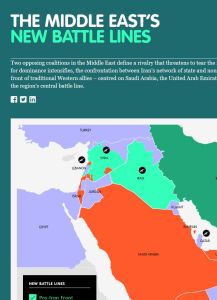Join getAbstract to access the summary!

Join getAbstract to access the summary!
Julien Barnes-Dacey, Ellie Geranmayeh and Hugh Lovatt
The Middle East’s New Battle Lines
ECFR, 2018
What's inside?
Europe is uniquely positioned to help de-escalate tensions between Iran and its rivals.
Recommendation
Iran has taken advantage of developments like the Syrian civil war to form new alliances and expand its influence in the Middle East. Iran’s growing political power has shifted the region’s battle lines, pitting the Islamic theocracy against Western-allied Gulf states and Israel. Compared with the belligerent US response, European policy has remained less resolute. In this policy brief, experts of the European Council on Foreign Relations explain why Europe is uniquely positioned to help prevent a wider regional war. getAbstract recommends their insights to anyone following the international diplomatic – and, at times, less diplomatic – dance with Iran.
Summary
About the Authors
Julien Barnes-Dacey, Ellie Geranmayeh and Hugh Lovatt are policy fellows at the European Council on Foreign Relations.
















Comment on this summary